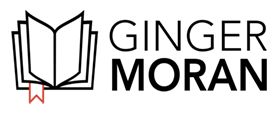Hi everybody. It’s Ginger Moran, PhD.
I am here again today to help you get your book out of stuck and into moving right along. I am in the middle of talking about doubts. Yesterday we talked about inner doubts today. We’re going talk today about outer doubts that often have to do with practicalities of life that have to be dealt with if we’re going to get our book done. I’m just going to jump right in to today’s lesson.
It is very often the case that we don’t have time, energy money, and we don’t think we have the talent for writing your book. So let’s talk about dealing with the practicalities.
There are many wrong ways to get started with writing a book, that is for sure.
So two ways doubt can stall your book interference and outer interference. Either one of them can cause a book to all, both of them together are almost guaranteed to stop you in your tracks.
So maybe you think you don’t have the time. You don’t have the money because it definitely takes some money of some kind, some kind of investment. You don’t think you have the energy, don’t think you have the talent. I often tell the story of when my children were young and I was raising them by myself and also my elderly father needed to be taken care of at the end of his life.
When he moved in with us, I worked full time. That was a time I really did not have very much time for writing. And it was really a struggle. What that meant was I had to cut my commitment way, way, way, way, way back. So if I got a page done a day, that was great, but that can be done. It only takes 15 minutes, as long as you have that planned. That’s the all important thing. So you don’t have to wake up and think, oh, what am I writing today?
It definitely takes money to write a book. You are going to need classes. You’re going to need some means of publishing or you’re going to need to be attending conferences to meet agents. It will definitely take money.
It can take anywhere from $37 for a Udemy course to $30,000 a year to get an MFA. There’s an unbelievable range of possibilities in between. You just have to decide what you want, what you can afford. Again, make the project fit the budget, the time budget, the money budget, the energy budget, because energy is a real thing and you can absolutely run out of it.
I am very much a morning person, so I just made sure that I wrote in the morning, usually before I was fully awake. I just did 15 minutes before anything else got going, because at the end of day, I’m really not worth anything.
Then that question of talent. That really is kind of made up. It’s kind of an idea that came along in the Romantic era of literature that somehow you have to be born with this big talent and you just come out writing or you come out composing music. And some people do. Some people are gifted from the beginning, but there’s nobody with the gift or without who doesn’t have to work really hard and really show commitment, discipline and real persistence. So talent is kind of a will o’ the wisp. It’s pretty much not worth worrying about.
You want to build your muscle for moving your confidence up and clarifying your vision.
Because if you’re over here with a foggy vision and your doubt is high, you might be stuck over here in frustration. If your confidence is high, but your vision isn’t very clear. You might not be writing your best work. If your vision is clear, but your doubt is really taking over, you might be over here in wheel spinning and where you want to be is up here in flow, which comes and goes. You might fall into any one of these other things at any time. But again, you always want to be raising your confidence, clarifying your vision to get yourself into flow.
Doubt is very much the name of the game. “Doubt is one of the names of intelligence,” Borges tells us. it’s very much a part of the condition. It’s certainly the part of the condition of being an artist and inner doubts, um, need to be faced down and provided a structure to help you get past them. Outer doubts, which can take the form of practicalities, you need to figure out what you can do at this time and just work within that framework. Don’t let them become a hindrance.
The best way to do this is to have a plan, have a blueprint, know where you’re going, then build your book, like you would build a house, and then throw a big old block party and have all your friends and neighbors come and celebrate.
Okay. That’s what I have to say today about the outer doubts. Talk to you later.

Leave A Comment